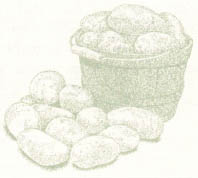

We all have a job to do. This chapter highlights the places where people worked and the jobs essential to their communities. Restaurants have been fashioned from all sorts of workplaces, such as post offices, fire stations, and even schoolhouses, where children persevered. The staffs at these establishments now work hard at providing great food and quality service while proudly displaying the type of work done by their predecessors.
664 CENTERVILLE PIKE
SLIPPERY ROCK, PA 16057
724-794-1899
Built in 1899 with foundation stone from the construction on Moore’s Bridge, Wolf Creek School originally stood on the western edge of the cemetery at Wolf Creek United Presbyterian Church. Through most of its history, the school housed students in grades one through eight. However, by the time of its closing, only first-graders were in attendance. The teacher at that time was Mrs. Mary Shaner Wimer, who had taught in the school district for thirty-three years. She was Butler County’s last teacher in a one-room schoolhouse.
Beginning in November 1989, the badly dilapidated building was dismantled and moved in sections to its present location adjacent to the Applebutter Inn on Centerville Pike in Slippery Rock, just down the road from Slippery Rock University. The structure has been restored to its original condition with the exception of new flooring and the addition of a modern fireplace, a kitchen, and restroom facilities. The inviting exterior’s crisp gray and white paint and stone chimney entice passersby to sample a traditional home-cooked meal.
Once inside, guests can revel in Wolf Creek’s many school artifacts. These carefully refurbished items are on display in the cafe’s two appealing rooms. The day’s menu items are written on old blackboards. Presidential pictures and maps adorn the walls. We were charmed by the original school desks, the potbelly stove, and the American flag standing in the corner next to an old copy of the Pledge of Allegiance. Tin cups holding sugar and sweetener are on the tables. A must-see item is the delightful water-stained painting done by an unknown schoolchild on brown wrapping paper. It has since been entitled “The Horse.”
The deck and pagoda add pleasant warm-weather seating to this delightful cafe. The service is friendly and helpful. The menu is varied, and serving sizes are plentiful. As we chatted with owner Mike Thompson, we tried the delicious Apple Nut Cake featured here.

 APPLE NUT CAKE
APPLE NUT CAKE 
2 eggs
4½ cups apples, chopped
2 cups sugar
1 teaspoon vanilla
½ cup nuts, chopped
½ cup plus 1 teaspoon vegetable oil
2½ cups flour
¾ teaspoon salt
2 teaspoons cinnamon
2 teaspoons baking soda
In a large bowl, break the eggs over the apples. Stir lightly with a fork. Mix in sugar, vanilla, nuts, and oil. Stir well. Gradually add dry ingredients. Pour into a 13-by-9-inch baking pan. Bake at 325 degrees for 1 hour. Serve warm with favorite vanilla sauce or ice cream. Yields 1 cake.

 ITALIAN PORTABELLO APPETIZER
ITALIAN PORTABELLO APPETIZER 
2 large portabello mushrooms
2 tablespoons butter
½ teaspoon fresh garlic, minced
½ cup tomatoes, diced
¼ teaspoon basil leaves, chopped
2 tablespoons Parmesan cheese, grated
2 slices provolone cheese
Greek dressing
Rinse mushrooms and pat dry. Remove stems and save. Melt butter in a medium saucepan and add garlic. Brush garlic butter onto mushroom caps and grill each side for 1 minute. Chop stems and sauté in remaining garlic butter. Add tomatoes, basil, and Parmesan. Place caps in a baking dish and spoon tomato mixture onto caps. Place provolone on top of mixture. Bake at 350 degrees for 5 minutes. Drizzle with Greek dressing and serve. Serves 2.


133 CAMP LANE
MCMURRAY, PA 15317
724-942-4878
Thompsonville School, built in 1904 as the first schoolhouse in the rural farming community of McMurray, educated children from first grade through sixth grade. Today, there are local residents who can remember ringing the school bell (which still hangs atop the schoolhouse) and eating lunch on the banks of the creek running near the front of the building.
After educating local children for thirty-five years, the school was closed in 1939. The building was subsequently used for craft and antique shops and for office space. Two French gentlemen opened a restaurant here in the 1970s. Rather than adding a kitchen, they prepared menu items table-side.
The current owners, Chuck and Shawn Davis, have preserved this piece of nostalgia and created an outstanding dining experience. The past mingles with the present as guests, seated in either the loft or the main dining room, enjoy structural features such as original flooring and well-worn wainscoting. Many old books sit perched upon a bookshelf. The cursive alphabet borders the room high on the rust-colored walls, where primitive prints hang alongside art created by the Davis children.
Guests can survey the menu on the blackboard at the front of the classroom or scan the miniature chalkboards brought right to the tables. The menu choices are innovative, surprising, and flavorful. You’ll find sauces like Horseradish Sour Cream and Papaya Coulis. The Oven-Roasted Duck is served with seasonal Marmalades. On the menu the night we dined were Grilled Beef Medallions, served with smoky bacon and Tomato Pepper Sauce.
We enjoyed a complimentary appetizer of White Bean and Parsley Pâté with crispy toast wedges. Its rapid disappearance spoke for itself. The Baked Spinach Crepes, served with Balsamic Onions in Mozzarella and Pepper Sauce, were as delicious as they were unusual. The Penne Pasta in Garlic Oil, tossed with pistachios and cherry-berry tomatoes, was a popular choice at our table and with other dinner guests as well. The entire meal was wonderful, down to the last bite of the Apple Spice Cake and Vanilla Ice Cream topped with Cinnamon Sauce. Do make reservations—it’s busy, and you don’t want to risk missing this experience.

 BALSAMIC VINAIGRETTE
BALSAMIC VINAIGRETTE 
2 cloves garlic, chopped
1 tablespoon parsley, chopped
½ teaspoon fresh rosemary, chopped
½ teaspoon fresh thyme, chopped
1 tablespoon cracked black pepper
1 teaspoon salt
2 cups balsamic vinegar
6 cups virgin olive oil
Combine all ingredients except olive oil in a large bowl. While whisking, slowly drizzle in oil until well blended. Yields 8 cups.

 DEVILED CRAB CAKES
DEVILED CRAB CAKES 
Crab cakes
1 pound Maryland blue crabmeat, cleaned
½ cup mayonnaise
¼ cup Dijon mustard
1 tablespoon Tabasco sauce
salt and pepper to taste
1 cup fresh breadcrumbs
oil for frying
lemon wedges for garnish
Tabasco Tartar Sauce (see below)
Combine crabmeat, mayonnaise, mustard, and Tabasco in a mixing bowl. Add salt and pepper. Stir in breadcrumbs. Mix well and form into 4 cakes about 4 inches wide and 1 inch thick. In a skillet, brown cakes on both sides in hot oil. Serve with lemon wedges and top with Tabasco Tartar Sauce. Serves 2.
Tabasco Tartar Sauce
½ cup mayonnaise
3 tablespoons balsamic vinegar
1 tablespoon Tabasco sauce
Combine all ingredients and mix well. Yields ¾ cup.

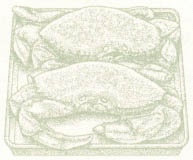
INTERSTATE 80, EXIT 40
WHITE HAVEN, PA 18661
570-443-4480
The cold, dry air of the Pocono Mountains is heralded as being therapeutic for many ailments. It was this climate that encouraged a group of late-nineteenth-century philanthropists to choose White Haven as the location for a sanatorium for individuals suffering from consumption—or, in today’s term, tuberculosis. The site was also desirable because it was accessible by rail from both New York and Philadelphia, yet was isolated enough to keep the tuberculosis contained.
The disease was widespread at the turn of the century. In 1901, when the White Haven Sanatorium was founded, Dr. Lawrence Flick supervised patients in only a few buildings. As the disease reached epidemic proportions, the facility grew; it even included a nursing school. The expanded sanatorium required additional power, which was provided by a coal-to-steam plant. The plant was funded by a donation of $125,000 from industrialist Pierre DuPont, a gift of gratitude for the care given his personal secretary, who was afflicted with the disease. Eventually, the introduction of the antibiotic streptomycin and the development of modern immunization techniques brought tuberculosis under control. Because of its dwindling patient population, the sanatorium eventually was forced to close, which started a gradual decline of the property.
Pictures on the wall of Powerhouse Eatery show what an eyesore the old power plant became. The structure began getting a facelift in 1989. Much of the existing building and plant hardware were preserved.
The power plant’s original smokestack, visible from Interstate 80, beckons travelers to an unexpected treat. Relics from the plant adorn the parking lot. Inside, a gray steel door separates the waiting area from the dining rooms. We were seated in the back dining area underneath two enormous Type H Stirling Boilers. No, we’re not experts in power plant equipment. Rather, we were educated by the menu’s back cover, which tells about the relics found throughout the restaurant. Among those items are original metal beams and pipes and various gauges. In the front dining room, a Babcock-Wilcox Boiler is on display. Metal doors are still embedded in the brick walls.
While the decor is reminiscent of the workaday world of yesteryear, there is nothing mundane about the food served here. Brand-new on the appetizer menu the night we visited was Shrimp and Roasted Corn Risotto. It was so tasty that we would have been happy to have an entrée-sized portion. Debbie ordered the tender and tasty Pork Tournedos in Bourbon Demi-Glace, served with Sausage Bread Stuffing, pecans, and dried cranberries. Karen enjoyed the Pork à la Powerhouse. Not yet out of steam, we managed to find room for Tiramisu and a light, refreshing All-Berry Mousse. Fueled up, we were ready to hit the road again!
1 cup fresh mozzarella, shredded
¼ cup green onions, chopped
1 tablespoon roasted garlic, minced
1 tablespoon fresh basil, chopped
2 plum tomatoes, sliced
½ cup extra-virgin olive oil
1 heart of romaine, chopped
1 tablespoon balsamic vinegar
In a mixing bowl, combine mozzarella, onions, garlic, basil, tomatoes, and olive oil. Pour mixture over romaine. Drizzle vinegar over greens. Serves 2.

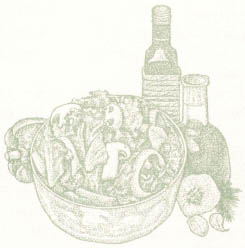
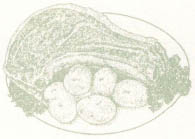
 PORK À LA POWERHOUSE
PORK À LA POWERHOUSE 
2 cloves garlic, minced
3 shallots, chopped
¼ cup butter
¼ cup all-purpose flour
¾ quart chicken stock
2 cups heavy cream
2 bunches dill, minced
1 pound jumbo lump crabmeat
salt and pepper to taste
4 8-ounce boneless pork loins
oil
Sauté garlic and shallots in butter until translucent. Add flour to make a roux. Cook 5 minutes until pale. Add chicken stock and cream. Cook sauce until it coats the back of a spoon, then strain. Add dill, crabmeat, and salt and pepper. Cook pork in oil until desired doneness. Split each pork loin, fill with crabmeat mixture, and coat with sauce. Serves 4.

CRESTMONT DRIVE
EAGLES MERE, PA 17731
570-525-3519
The highest point in Eagles Mere is twenty-one hundred feet above sea level. Some call this mountain Hemlock Hill, while others call it Cyclone Hill because of the 1892 storm that stripped the peak of its native timber. Several years later, William Watson was sitting in his hotel room and gazing up at the bare mountain when he felt a call to build a family resort. In June 1900, The Crestmont Inn opened. During its heyday, vacationing families returned to The Crestmont year after year to escape the heat and the pressures of turn-of-the-century city life. They looked forward to the wonderful food, the excellent service, the enjoyable activities, and the leisurely acquaintances they built up over time.
The last of the grand hotels to open in Eagles Mere, The Crestmont Inn was also the last to close, in 1969. In 1971, the Eagles Mere Conservancy purchased the hotel and its 320-plus acres. When the property was purchased by Robert and Kathleen Oliver several years later, the hotel was so dilapidated that it had to be torn down. Kathleen, who had fond memories of spending her summers at The Crestmont Inn, longed to re-create her experiences. Although the main building was gone, the Olivers saved and restored other buildings on the property through a labor of love.
Today’s Crestmont Inn consists primarily of two buildings, a pool, tennis courts, and the surrounding grounds. Rooms for overnight visitors are located in the staff house, which once had forty rooms used by maids, bellhops, and other employees. It has now been converted to fourteen bedrooms, all with private baths. The Crestmont Inn’s dining room is located in what was the original wash house, which once contained numerous commercial irons, washing machines, and no fewer than twenty-four ironing boards to do the myriad table linens and other laundry.
The linens are still in evidence, pressed and fresh on the tables. The fresh flowers and the crystal create a beautiful dining atmosphere. The dinner menu has something for everyone. There are several Seafood choices and at least a Veal, a Beef, and a Chicken entrée. Grilled Country Ham frequently appears on the menu as well.
We had breakfast at the inn and thoroughly reveled in the experience. As we entered the dining room, the tables were already set with Orange Juice and Melon Cups. The choices for the morning included eggs any style, Blueberry Pancakes, and Eggs Benedict. Each plate was garnished with fresh blueberries and strawberries and a fresh apricot, halved, in which was a dollop of homemade Strawberry Butter. The pancakes were light, fluffy, and chock full of berries; the Strawberry Butter added a delightful touch. The Hollandaise Sauce on the Eggs Benedict was perfect, creamy, and light. As if this wasn’t yummy enough, we then tried the Bananas Caribbean, a citrus version of Bananas Foster. It was creative and gastronomically superb. If breakfast is this good, then lunch and dinner are not to be missed!
Eagles Mere, where lovely vacation homes beg visitors to have a walk about town, has an aura of bygone days. Thanks to its repertoire of excellent food and the kind of sincere, genteel service where the staff readily calls guests by name, The Crestmont Inn has captured the spirit of its predecessor.

 STUFFED FILLET OF FLOUNDER
STUFFED FILLET OF FLOUNDER 
8-ounce package cream cheese, softened
1 cup lobster, cut into small pieces
1 cup shrimp, cut into small pieces
1 cup crabmeat, flaked
1 tablespoon lemon juice
1 tablespoon lobster base
½ cup mayonnaise
1 teaspoon Tabasco sauce
½ cup breadcrumbs
12 4-ounce portions flounder
Imperial Sauce (see next column)
6 slices lemon
parsley and fresh herbs for garnish
Place first 9 ingredients in a mixing bowl and mix with hands, adding extra breadcrumbs if necessary to bind. Form into 6 oblong shapes the size of a very large egg. Preheat oven to 400 degrees. Place 6 flounder fillets skin side down on ovenproof seashells. Place stuffing mixture on flounder. Put remaining 6 fillets on top of stuffing, also skin side down. Gently fold fish pieces around stuffing. Place a generous amount of Imperial Sauce over entire fish mixture, covering to seal edges. Bake uncovered for 20 minutes until sauce forms a golden glaze. Serve immediately with a lemon slice and parsley or a sprig of fresh herbs. Serves 6.
Imperial Sauce
1 tablespoon butter
1 tablespoon flour
¾ cup milk
2 cups mayonnaise
1 tablespoon Worcestershire sauce
¼ teaspoon salt
¼ teaspoon Tabasco sauce
1 tablespoon lemon juice
dash of pepper
1 egg, beaten
Melt butter in a 2-quart saucepan over medium heat. Slowly stir in flour; whisk for about 5 minutes. Gradually add milk and cook until thick. Cool completely, then add mayonnaise, Worcestershire, salt, Tabasco, lemon juice, and pepper; combine thoroughly. Fold in beaten egg. Yields approximately 3 cups.
Note: This sauce may be stored in a tightly covered container in the refrigerator for up to 1 week.

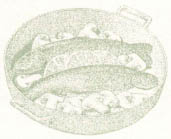
160 DUNLAP STREET
BELLEFONTE, PA 16823
814-355-7764
In its advertising, The Gamble Mill Tavern says it offers “fine dining in a casual atmosphere surrounded by the warmth of old wood, brick, and stone in a historic grist mill.” The minute we walked in, we had to agree. Relics from the mill decorate the lobby, and one of the old mill wheels sits just outside the front door. Water still flows through the raceway and under the building, and enormous wooden beams are visible throughout. Large, original windows keep the interior bright.
The mill was built by William Lamb, who is credited with organizing the first permanent settlement in the Nittany Valley. Lamb constructed his home along the west bank of Spring Creek in 1785. A year later, he built the mill just south of his home. The mill was a drawing card for new settlers, helping the area prosper. It became known as Lamb’s Crossing, and a sign outside the restaurant still proclaims it as such.
In 1794, John Dunlop, an ironmaster from the Cumberland Valley, bought all of Lamb’s properties, including the Big Spring, called Beautiful Fountain at the time. The town’s name, Bellefonte, is derived from that spring. James Harris and the Dunlop family are credited with laying out the town.
The mill passed through various owners over the years. John Gamble purchased it in 1901. After his retirement in 1923, the building slowly deteriorated until it was eventually condemned and marked for demolition. With the support of a dedicated local group, Ted Conklin purchased the mill in 1975. The following year, it became the first local building to be placed on the National Register of Historic Places.
The food here is as memorable as the building’s past. We had difficulty choosing an appetizer from the innovative list, finally settling on a Mushroom Turnover and a dish called Rajas con Queso, which consisted of roasted red peppers, jalapeños, tomatoes, onions, and cream cheese served warm with tortilla chips. Both were as tasty as we’d hoped. The creamy Raspberry Dressing on the salad that came with Karen’s Mushroom Turnover was unbelievably good. The entrée choices weren’t any easier than the appetizers had been. Sandwiches like Chicken Giuseppe (a chicken breast marinated in Balsamic Vinaigrette and then topped with prosciutto, provolone, pepperocini, olives, roasted red peppers, and Basil Mayonnaise) and Mango Barbecued Chicken were tempting. Eventually, Debbie selected the Butternut Ravioli (spinach ravioli filled with butternut squash, served in a sauce of roasted garlic, mushrooms, and sun-dried tomatoes). The flavors were exquisite. Karen found her Polynesian Chicken (a warm salad of diced chicken, melon, avocado, and bell peppers in Orange Ginger Sauce) equally flavorful. By the time the dessert tray arrived, our decision-making skills had deserted us entirely, so we asked our server to choose for us. The rich Cappuccino Torte proved the perfect ending to a perfect meal. Oh, to have to face such choices every day!

 VEAL MOREL
VEAL MOREL 
¼ cup brandy
 cup dry white wine
cup dry white wine
 cup dry red wine
cup dry red wine
3 tablespoons shallots, peeled
2½ cups veal stock
¼ cup demi-glace stock
¼ cup heavy cream
¼ cup unsalted butter, cubed
salt and pepper to taste
1 ounce dried morel mushrooms
8 1½-inch-thick veal loin chops
Bring brandy, wines, and shallots to a simmer in a noncorrosive pot. Add stocks. Reduce by ½, strain, and return to pot. Add cream and heat; do not boil. Whisk in butter and add salt and pepper. Soak mushrooms in hot water until soft; drain. Season veal with salt and pepper and grill 10 minutes per inch of thickness for medium-rare. Stir morels into sauce. Ladle sauce over meat and serve with garlic mashed potatoes. Serves 8.

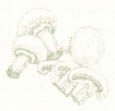

 GRILLED ASPARAGUS WITH RASPBERRY VINAIGRETTE
GRILLED ASPARAGUS WITH RASPBERRY VINAIGRETTE 
Salad
1 pound asparagus spears, trimmed to 5 inches
1 cup Raspberry Vinaigrette (see below)
12 to 16 cups mesclun lettuce
¾ pound Montrachet cheese
Brush asparagus with Raspberry Vinaigrette. Grill over medium-hot coals for 3 to 5 minutes. Toss mesclun with remaining vinaigrette and divide among 8 plates. Fan asparagus over greens. Slice cheese into 8 rounds and place at base of asparagus fan. Serves 8.
Raspberry Vinaigrette
2 egg yolks
 cup dry white wine
cup dry white wine
 cup raspberry juice
cup raspberry juice
½ cup raspberry vinegar
2 teaspoons granulated sugar
1½ teaspoons garlic, peeled and chopped
¼ teaspoon raspberry extract
2½ cups oil
2½ tablespoons fresh tarragon, chopped
Combine first 7 ingredients. Drizzle in oil. Mix in tarragon by hand. Yields approximately 4 cups.

807 FOURTH AVENUE
PATTON, PA 16668
814-674-5532
The staff and the customers are on a first-name basis here, just as they have been since 1890, when this hotel and restaurant opened. It was built to serve the men working in nearby mines, who were paid here, ate here, and some say sought female entertainment here. Pictures on the walls from the early days show dozens of miners lounging on the expansive porch, perhaps after a filling evening meal. Most of the food served at The Miners’ Rest today is homemade. The delicious Meat Loaf and the Chili are local favorites. Equally popular are desserts like the ample Apple Dumpling, served warm with vanilla ice cream, and the old-fashioned Coconut Cream Pie.
The restaurant’s decor is charming in its simplicity. Not only does The Miners’ Rest have a tin-tile ceiling, but it is one of the few places we’ve seen with tin tiles on the walls as well. Attractively arranged and proudly displayed is an assortment of mine equipment, from lanterns to helmets to tin lunch buckets. Picks and coal scuttles are here, too, alongside photographs of the men who may have used them. An antique radio plays in the corner of the room. Pictures of local attractions such as Horseshoe Curve further emphasize the restaurant’s pride in the county’s heritage.
Seldom Seen Mine is just down the road, about four miles north of Patton. This mine and many others took advantage of the area’s rich natural resources. Those resources and the county’s geographic location allowed the area to play a significant role in Pennsylvania’s rise as an industrial leader.
Seldom Seen Mine was originally called Chest Creek Mine Number 1, which began operation in the early days of mechanization. Seldom Seen Mine employed a relatively small number of miners—approximately fifteen to twenty. In small mines such as this, coal was typically extracted using old-fashioned techniques like hand-loading. These mines were at one time owned by wealthy local families, who employed immigrants on a production basis, sometimes paying them as little as twenty-five cents a ton for coal mined and loaded! Even though the miners were paid only for this work, they were also personally responsible for the safety of their work areas inside the mine. This included timbering and shoring up the roof, tasks that sometimes were not done as thoroughly as possible, due to the time they took away from the actual production of coal.
Today, descendants of the immigrants who made their living in these mines give tourists an idea of what life was like for coal miners at Seldom Seen Mine. The Miners’ Rest allows a glimpse into a small part of this history as well.

4-pound, 2-ounce can chunk light tuna, packed in water
2 cups celery, diced
1 cup onion, diced
1¾ teaspoons pepper
1¾ teaspoons celery salt
1¾ teaspoons celery seed
1 teaspoon garlic powder
1 tablespoon dill weed
1 tablespoon parsley flakes
1 to 1½ cups mayonnaise
Drain tuna thoroughly. Combine all ingredients except tuna and mayonnaise. Add tuna and mix again, breaking up any large pieces. Add enough mayonnaise to hold together, making sure mixture is not too dry and not too moist. Cover and refrigerate. Serves 12.

 CHILI
CHILI 
2½ pounds ground chuck
1 medium onion, chopped
1 tablespoon fresh garlic, chopped
2 cups water
2 cups green pepper, chopped
3 cups dark red kidney beans
6 cups canned tomatoes
2 tablespoons salt
1 tablespoon chili powder
pepper to taste
Brown ground chuck, onion, and garlic. Add water, green peppers, kidney beans, and tomatoes. Bring to a boil, stirring constantly, then reduce to a simmer and cook for about ½ hour. Add seasonings and simmer for about 2 more hours, stirring every 15 minutes. After cooling, skim off fat. Serves 12.

 MEATBALLS
MEATBALLS 
1¼ cups Italian breadcrumbs
5 large eggs
1 cup milk
¼ cup mozzarella, shredded
¼ cup provolone, shredded
4 tablespoons dried parsley flakes
1 tablespoon dried garlic granules
½ teaspoon pepper
2½ pounds ground chuck
Combine all ingredients except ground chuck in a large bowl and mix thoroughly. Add ground chuck and mix thoroughly again. Using a 2¾-ounce ice cream scoop, make meatballs. Place meatballs on a large baking tray. Add a small amount of water on tray and bake at 450 degrees for 20 to 25 minutes. Let cool and refrigerate until ready to use. Yields approximately 15 meatballs.

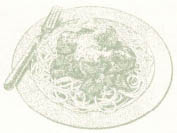
33-35 NORTH MARKET STREET
LANCASTER, PA 17603
717-299-4602
Although this building was completed and in use around 1893, the tavern license granted to George S. Deering, on display as you enter, gives a date of March 1916. During the early twentieth century, the Grape Tavern, a local social organization, used this spot as its headquarters. No one is quite sure what the group did, other than to meet and imbibe. After it disbanded, the Commercial Printing Company occupied the building, serving Lancaster’s printing needs until the late 1970s.
When the printing company relinquished its space in 1978, the building returned to its original use, thanks to The Lancaster Dispensing Co., a Victorian pub featuring spirits, good food, and entertainment. It’s located on an adorable pedestrian street just off of Lancaster’s main drag.
As you enter, you can’t help noticing the enormous bar that runs the length of the restaurant’s back wall. The stained-glass windows on either side of the bar and the leaded-glass cupboard doors speak to the building’s era of origin. The ceiling fans quietly spinning overhead provide an additional Victorian touch, as do the leaded-glass transoms and wooden flooring. As we chatted with Judy Ross, one of the owners, she pointed out that the building’s wainscoting was fashioned from shutters of the period. Augmenting the decor are the shiny brass railings around the bar, hanging plants, and red cloths graced by fresh flowers at each table.
Fresh ingredients for many of the menu items are purchased right next door at the Lancaster Central Market House, a historic building in its own right. Variety is plentiful, as the menu features multiple appetizers and salads. The Lancaster Dispensing Co.’s Chicken Salad can be prepared six different ways: with Honey Mustard; with Sun-Dried Tomatoes; with Herbed Mayonnaise; Cajun-Style; Jamaican Jerk-Style; and Thai-Style with Peanut Sauce. Burgers and open-faced sandwiches are on the menu, alongside a lengthy list of overstuffed sandwiches, served with Chips, Potato Salad, Macaroni Salad, or Coleslaw. The seven vegetarian selections on the menu suggest how our eating habits have changed over the years. However, one thing at The Lancaster Dispensing Co. that hasn’t changed is the original wallpaper. Several years ago, the owners discussed an update, but after looking at many, many samples, they couldn’t find anything better than what was already there, so they decided to leave well enough alone. We’re glad they did.

 BLOODY MARY MIX
BLOODY MARY MIX 
46-ounce can tomato juice
46-ounce can V-8
4 tablespoons horseradish
2 tablespoons Worcestershire sauce
2 tablespoons Rose’s lime juice
2 tablespoons celery salt
several dashes of Tabasco
several dashes of bitters
Combine ingredients and mix well. Pour over vodka and ice. Serve with a twist of lemon and lime and a fresh celery stalk. Serves 10 to 12.

 ARTICHOKE AND SPINACH DIP
ARTICHOKE AND SPINACH DIP 
½ cup onions, diced fine
2 tablespoons vegetable oil, divided
2 14-ounce cans artichoke hearts, drained and chopped coarse
1½ teaspoons salt
¾ teaspoon pepper
¼ cup white wine
1½ teaspoons roasted garlic
10-ounce bag fresh spinach
3 8-ounce packages cream cheese
Sauté onions in 1 tablespoon of the vegetable oil until they start to soften. Add artichoke hearts, salt, pepper, and wine. Continue to sauté about 10 minutes until soft. Add garlic and cook 5 minutes more. In a separate pan, cook spinach in remaining oil. Drain and chop spinach and add it to the artichoke mixture. Add cream cheese and mix thoroughly. Refrigerate. To serve, heat desired quantity of dip by placing under broiler until lightly browned. Serve with baked bread or crackers. Yields 6 cups.

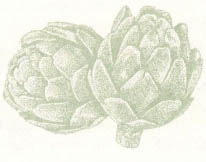
10 REED STREET
PHILADELPHIA, PA 19147
215-462-4646
Upon entering the Engine 46 Steakhouse, there is no mistaking it for anything other than the 1894 firehouse that it is. The tables are covered in Dalmatian-print cloths, and pictures of the lovable animals are everywhere. Red chairs and woodwork accent the black and white, creating a fun, upbeat atmosphere. The raised bar area, which encompasses the entire left side of the downstairs dining room, has old-fashioned ladders hanging above it. Decorating the shelves that house the liquor stock are patches from a wide variety of fire companies.
Our favorite table is on the first floor, tucked away just off the front door. The arched entry to this table has the station number in tile. The brass firemen’s pole, situated where it’s been for over a hundred years, now has a table for six surrounding it. The grill and headlights from one of the fire company’s old engines hang on the wall nearby. Farther into the restaurant, a pegboard holds the coats and helmets of some of the fireman who were called to action from this station.
The creatively decorated stairway leading to the second floor has been painted in gray, then sponge-painted in black. Black-and-white photographs of Philadelphia fireman in action over the years have been decoupaged on the walls, creating historical firefighting wallpaper of sorts.
In the upstairs dining room, additional photos on the walls chronicle the efforts of area firefighters. Cast-iron insignias representing these men are displayed along one wall, as are license plates from a variety of local fire companies. Antique call boxes are on view throughout the room, as is a large collection of vintage fire extinguishers and hose nozzles.
Stopping in at Engine 46 for a Saturday-afternoon snack, we were immediately attracted to the Coconut Onion Rings listed on the specials board. Served with Sweet and Sour Sauce, the onion rings were not too sweet and had just a hint of coconut. More importantly, they were not too greasy. We enjoyed every bite. Next came dessert. Karen ordered the Caramel Apple Granny, a torte with buttery caramel- and toffee-laden custard combined with fresh Granny Smith apples. Debbie ordered a hot fudge brownie sundae, foolishly expecting it to be served in a typical parfait glass. Diners beware! When something is named the Towering Inferno, as this sundae was, take note. It was huge enough to be served on a dinner plate and had ice cream and whipped cream mounded several inches high! In fact, it was so large that everyone in the dining room gasped when our waitress placed it on the table.
The rest of the menu is All-American. Buffalo Wings, Potato Skins, and Four-Alarm Cheese Fries are among the appetizer selections. There are seven sandwich selections, and the entrée menu ranges from Steaks and Ribs to Shrimp and even Lobster Tails.
As we began our afternoon snack, a birthday party of energetic young boys was just winding down. From the young to the young at heart, Engine 46 Steakhouse provides a good time.

 SECRET SPICY RANCH DRESSING
SECRET SPICY RANCH DRESSING 
4 cups ranch dressing
3 teaspoons fresh lemon juice
 cup horseradish
cup horseradish
2½ teaspoons cayenne pepper
Combine ingredients in a medium bowl. Yields about 4½ cups.
Note: This dressing is great on wrap sandwiches and as a dip for fresh vegetables or other appetizers.

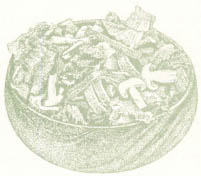
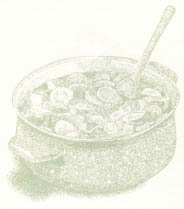
 PRIME RIB SOUP
PRIME RIB SOUP 
2 to 3 cups fresh vegetables of your choice, diced
28-ounce can tomato purée
½ cup beef base
2 thick slices prime rib, diced
3 large potatoes, diced
pinch of seasoned salt
salt and pepper to taste
8 cups water
Place all ingredients in a large soup pot. Bring to a boil and stir. Reduce heat to medium and cook for 4 hours. Serves 8 to 12.

120 WEXFORD BAYNE ROAD
WEXFORD, PA 15090
724-934-3354
The president was Theodore Roosevelt, baseball’s National League batting title was won for the fourth time by Honus Wagner, and the Ford Model T was being developed. It was 1906. That year also saw the beginning of an electric streetcar—known as the Harmony Short Line—that furnished transportation from Pittsburgh through Wexford and on to points north.
The Harmony Short Line’s wooden, one-room station, operated by Alphonsus Brooker, was located at the corner of Brennan and Wexford Bayne Roads. The Harmony Short Line continued in operation until 1931. Late that year, Mark Brooker and a team of draft horses pulled the station to its current location at the corner of Church and Wexford Bayne Roads. From then until 1963, the station served as Wexford’s post office.
Located just around the corner, the General Store and Cole’s Hotel and Bar look just as they did at the turn of the century. The name Wexford Post Office Deli was chosen in tribute to the history of the building and the area.
Wexford Post Office Deli is the type of place that makes you smile when you just drive by. It’s a cheerful, cozy, one-stop delicatessen offering a wide variety of foods. The selection includes cheeses, luncheon meats, soups, sandwiches, main dishes, breads, cookies, cheesecakes, tortes, and pies. For example, the repertoire includes four different varieties of Potato Salad! The deli allows local residents a delicious alternative to fast-food eateries and expensive restaurants. It’s also a popular catering choice for both families and businesses.
Our favorite time to visit Wexford Post Office Deli is in warm weather. We like to dine alfresco at the gingham-checked picnic tables surrounded by a white picket fence. Then again, the deli is appealing during a tour of the area’s fall foliage, as we also like to enjoy a sandwich and a bowl of soup when there’s a nip in the air.

 LEMON BARS
LEMON BARS 
Crust
2 cups flour
½ cup powdered sugar
1 cup butter
Preheat oven to 350 degrees. Combine ingredients in a bowl or food processor, forming a course meal. Press into a sheet pan. Bake for 15 minutes.
Filling
2 cups sugar
6 large eggs
¾ cup flour
1¼ teaspoons baking powder
1 cups lemon juice
cups lemon juice
powdered sugar for garnish
Combine all ingredients except powdered sugar in a large mixing bowl. Pour mixture over crust. Bake at 350 degrees for 45 minutes until firm in center. Cool. Sprinkle with powdered sugar and cut into bars. Yields about 2 dozen bars.

 AMERICAN POTATO SALAD
AMERICAN POTATO SALAD 
5 pounds Idaho potatoes
½ bunch celery, chopped
½ large green pepper, chopped fine
½ large red pepper, chopped fine
1½ teaspoons celery seed
salt and white pepper to taste
1½ to 1¾ cups mayonnaise
1½ tablespoons Dijon mustard
Cook potatoes in a pot of water until a fork goes through easily. Cool potatoes in refrigerator, then peel and cube. Add remaining ingredients and mix well. Use more mayonnaise if necessary. Serves 16 to 20.

